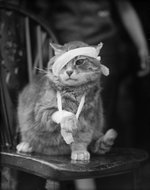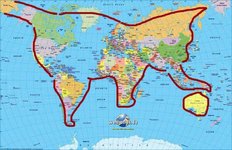...
«Φύσει ων αριστοκρατικός αποστρέφεται ο γάτος την υπερβολικήν οικειότητα, την αδιακρισίαν και ιδίως πάσαν αξίωσιν περιορισμού της απολύτου αυτού ανεξαρτησίας. Υπεραγαπά μεν τας θωπείας, αλλά μόνον όταν έχη όρεξιν αυτών. Αρέσκεται να πηδά εις τα γόνατά μας, όχι όμως και να συλλαμβάνεται αγροίκως εκ του τραχήλου δια να τοποθετηθή επ' αυτών ως δέμα· προσκαλούμενος ουδέποτε έρχεται αμέσως ή κατ' ευθείαν, αλλά μετά τινα αναβολήν και δι' ελιγμού, ωσεί θέλων ν' αποδείξη ότι προσήλθεν ως φίλος αυθορμήτως και ουχί ως δούλος υπακούσας εις προσταγήν. Πολύ μάλλον και του σκύλου και παντός άλλου ζώου ευχαριστείται να μένη μακράς ώρας εις τον κοιτώνα μας, αναπαυόμενος παρά την εστίαν ή επισκοπών τους διαβάτας εκ του παραθύρου, αλλά θεωρεί προδοσίαν το να μη ανοιχθή εις αυτόν αμέσως η θύρα, άμα επιθυμήσει να εξέλθη. Υπέρ παν όμως άλλο βδελύσσεται τους διακόπτοντας την σειράν των συλλογισμών του όταν ονειροπολή ή τον ύπνον του όταν κοιμάται. Τούτο κάλλιστα εγνώριζεν ο προφήτης Μωάμεθ, όστις σπεύδων ημέραν τινά να μεταβή εις την εσπερινήν προσευχήν επροτίμησε να κόψη δια ψαλίδος την άκραν του ενδύματός του, παρά να ταράξη την ανάπαυσιν του επ' αυτού αποκοιμηθέντος ευνοουμένου του γάτου.»
Εμμανουήλ Ροΐδης, από το κείμενο «Iστορία μιας γάτας».
«Φύσει ων αριστοκρατικός αποστρέφεται ο γάτος την υπερβολικήν οικειότητα, την αδιακρισίαν και ιδίως πάσαν αξίωσιν περιορισμού της απολύτου αυτού ανεξαρτησίας. Υπεραγαπά μεν τας θωπείας, αλλά μόνον όταν έχη όρεξιν αυτών. Αρέσκεται να πηδά εις τα γόνατά μας, όχι όμως και να συλλαμβάνεται αγροίκως εκ του τραχήλου δια να τοποθετηθή επ' αυτών ως δέμα· προσκαλούμενος ουδέποτε έρχεται αμέσως ή κατ' ευθείαν, αλλά μετά τινα αναβολήν και δι' ελιγμού, ωσεί θέλων ν' αποδείξη ότι προσήλθεν ως φίλος αυθορμήτως και ουχί ως δούλος υπακούσας εις προσταγήν. Πολύ μάλλον και του σκύλου και παντός άλλου ζώου ευχαριστείται να μένη μακράς ώρας εις τον κοιτώνα μας, αναπαυόμενος παρά την εστίαν ή επισκοπών τους διαβάτας εκ του παραθύρου, αλλά θεωρεί προδοσίαν το να μη ανοιχθή εις αυτόν αμέσως η θύρα, άμα επιθυμήσει να εξέλθη. Υπέρ παν όμως άλλο βδελύσσεται τους διακόπτοντας την σειράν των συλλογισμών του όταν ονειροπολή ή τον ύπνον του όταν κοιμάται. Τούτο κάλλιστα εγνώριζεν ο προφήτης Μωάμεθ, όστις σπεύδων ημέραν τινά να μεταβή εις την εσπερινήν προσευχήν επροτίμησε να κόψη δια ψαλίδος την άκραν του ενδύματός του, παρά να ταράξη την ανάπαυσιν του επ' αυτού αποκοιμηθέντος ευνοουμένου του γάτου.»
Εμμανουήλ Ροΐδης, από το κείμενο «Iστορία μιας γάτας».



